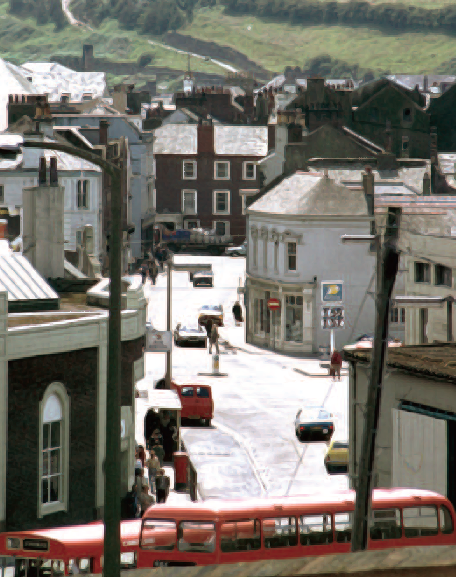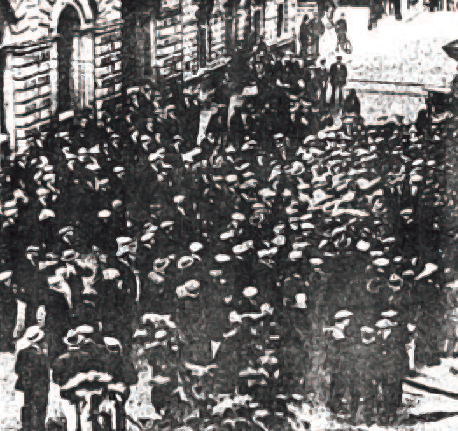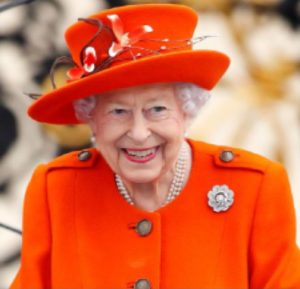It should have been one of the happiest nights of Fred Gill’s life. Nellie Rickaby, the girl he was courting, at last allowed him to have sex with her. But there was just one problem. On that same night – Friday, July 25th, 1930 – a money-lender was savagely murdered in Fred’s home town of Keighley, West Yorkshire. And just three days later it was Fred who was charged with the murder…
ALTHOUGH THE Depression had made unemployment almost the norm, Fred Gill had been luckier than many. He had work for at least three days a week as a crane driver at the engineering works of Prince and Smith. That brought him 19 shillings a week, to which he could add eight shillings and sixpence dole money. At 26, Fred was still single but he hoped to marry Nellie Rickaby. Meanwhile, he lived with his brother at 1 Providence Place, Keighley, where Mrs. Emily Myers kept house for both of them. The last week of July was the traditional holiday break. Yorkshire’s factories closed down for seven days and workers who could afford it went to the seaside. Fred and Nellie had a trip planned to Whitehaven in Cumberland, where Nellie had relatives with whom they could stay. The snag was that Fred was desperately short of money. He was behind with his share of the rent and in debt to a money-lender. Days earlier Oliver Preston had written demanding payment of arrears of £3 12s. on a loan taken out months before.

Preston ran his business from a small top-floor office at 150 Station Street, near Keighley railway station, which he used as a commuter from his home a few miles away at Oakworth. Adjacent to Preston’s office was Wilton Joy’s hairdressing salon, both premises sharing a narrow staircase from street-level. In anticipation of holiday weekend requests for loans, Preston had withdrawn £80 from the Yorkshire Bank on the Thursday morning. He often spent the night at his office, sleeping on the sofa; but rarely on a Friday, when he usually went to a club in Keighley for a couple of hours and then caught the last train home. He was not on the 10.40 out of Keighley for Oakworth on July 25th, however, and his absence was remarked upon by station staff who were accustomed to seeing him at that time. At about 9 a.m. the next day Wilton Joy went into Preston’s office to put coins in their shared gas meter.
The curtains were drawn and in the half-light he saw the form of a man apparently asleep on the sofa. Assuming that the money-lender had changed his routine and decided to stay overnight, Joy returned to his salon to attend to his first customer. Nearly two hours later, when several of the money-lender’s clients had called and received no response to their knocks at his door, a friend of Preston’s was asked to investigate. After trying unsuccessfully to rouse the money-lender, William Stell pulled back the curtains and then saw that his friend had been attacked.
A police constable on point-duty nearby was called and he found that Oliver Preston had sustained severe injuries to the right side of his head. His right eye was swollen and black and bloody fingermarks indicated that he had tried to get to the door. Money was missing, and two items found in the office were to prove important in the investigation. They were a bloodstained copy of Friday’s Yorkshire Evening Post and a steel bar about a foot long and an inch in diameter. Taken to hospital, Oliver Preston died early on July 28th, 1930, without recovering consciousness. William Stell told detectives about a brief conversation he’d had with Fred Gill outside the money-lender’s office at about 6 p.m. on the Friday. “Have you come for a loan?’’ Stell had asked. “Yes,’’ Gill replied. “If I can get ten pounds I can repay twenty pounds. I can pay twelve shillings per fortnight.’’ He then went into the office, but came out almost immediately. It seemed that his request for money had been rejected – his arrears would have to be settled before a further loan could be considered.
As he left the building, Gill told Stell that he had to come back at 10 a.m. the next day. He was also seen leaving by a couple who followed him in. They recalled that he was still wearing his working attire, a dark blue overall. Detectives took a particular interest in Fred Gill because he was behind with his payments to Preston and had been seen at the money-lender’s office on the night of the attack. They learned that at around 5 p.m. on Friday, Gill had been observed rummaging in the scrap-heap at work. He said later that he was looking for a length of metal to use as a poker. The bar found in Preston’s office was of a type which might have been discarded from the machine shop at the factory where Gill worked – the ends of the bar bore evidence of having been turned in a lathe.
Nobody, however, had seen Fred Gill with such a weapon. Checking with the suspect’s housekeeper, the police were told that he had come home at about 6.10 p.m. on Friday, but had left shortly afterwards still wearing his blue overall. A news vendor outside the railway station remembered seeing Fred Gill shortly after 6.15 that evening when Fred had taken a copy of the Yorkshire Evening Post, saying he would pay for it after he had been to have his hair cut. The edition of the newspaper was the same as that found in Oliver Preston’s office, and had not been on sale in Keighley until just before 6.15. Another witness told the police that he had seen Gill near the barber’s, and had told him that as the salon was full he would come back later.
Nobody saw Gill go into the money-lender’s office after his earlier visit that evening, but when another client went to see Preston at 6.20 he found the door locked. He went away, returning about 10 minutes later. The door was still locked, but he heard what he later thought might have been grunts and groans and the sound of someone moving about the office. He was in fact listening to murder, but he departed again, deciding to leave his business with the money-lender until the next day. The next sighting of Fred Gill was at 6.40 when the news vendor saw him apparently walking home. He reappeared 20 minutes later, washed and changed, paid the news vendor for the paper and went on to Nellie Rickaby’s home. The couple then went shopping, buying items for the holiday, including their railway tickets. Several shop assistants recalled that Fred and Nellie appeared to be on a spending spree. Fred’s finances seemed to have improved dramatically within the last few hours. The couple remained together until well after midnight, spending most of their time together having sex. In fact, Nellie was later to admit that they had not only been having sex together for the first time but they really made the most of their new-found passions. When Oliver Preston was discovered slumped on his bloodstained sofa, the couple were well on their way to Whitehaven.

Their holiday was heavenly. With money to spare and Nellie being more than sexually accommodating, what could be better? At least that was until detectives arrived from Yorkshire. Fred had been treating Nellie and himself to the best seats at the cinema. He had also bought Nellie chocolates and a hat. And he had not failed to impress her when he’d spent a week’s wages in an impulsive half-hour. Arrested just before midnight on Monday, he was found to have £16 in his pockets. It was later learned that he’d squared up his rent to the extent of £5 and had spent £15 on the holiday. Totted-up, his expenditure and cash in hand were equivalent to the sum stolen from Oliver Preston. “I did not do it,’’ Gill told Keighley magistrates when he appeared in court the next day. His solicitor complained about the way his client had been treated by the police, claiming it amounted almost to “the third degree.’’ With Fred Gill remanded in custody, the police continued their investigation. Detective Chief Superintendent Wilfred Blacker had arrived from West Riding Constabulary’s Wakefield headquarters to lead the inquiry. Supervising a search at Gill’s lodgings, he took away the blue overall and shoes the suspect had been wearing in the early hours of Friday evening.
Local analysts carried out two independent tests for traces of blood but found nothing, so the clothing was sent to Home Office laboratories in London. Using the recently developed precipitant test, forensic scientists found the evidence Blacker was seeking. Extensive bloodstains were identified on the knees of the overalls – had Gill knelt on Oliver Preston’s bloodstained floor? The soles of the suspect’s shoes also bore traces of blood. The four-day trial of Fred Gill for Oliver Preston’s murder began at Leeds Assizes on December 10th, 1930. After he had pleaded “not guilty,’’ more than 60 prosecution witnesses told of seeing him loitering near the money-lender’s office on the night of the attack, or detailed his shaky finances prior to the killing.
A timid Nellie Rickaby spoke haltingly about her relationship with Gill. Asked about her lover’s free-spending after the attack on the money-lender, she said she thought Fred had just been lucky “on the horses.’’ Telling of her frequent requests to Gill to start saving for their marriage, she said they had made love several times on the Friday night after he had convinced her of his secret thrift. Having sex with Nellie, it seemed, had been his reward. Ashen-faced and distressed, Gill told the court that his apparent sudden prosperity after Preston’s death had come from horse-racing winnings which he had been keeping in reserve and with which he wanted to please Nellie.
This conflicted, however, with the evidence of creditbrokers brought from as far away as Leeds and Bradford to tell how they had refused loans to Gill during the six months prior to the murder. After spending three hours in the witness-box, Gill was given a seat when he seemed about to collapse. The integrity of the prosecution was then called into question when Dr. Logan was summoned to give scientific evidence for the defence.
He told the court that he had been asked to testify only a few days earlier, in place of the original defence witness who had pleaded with Gill’s solicitor to be released from appearing. Dr. Logan said that this unnamed doctor had been approached by a high-ranking detective sent personally by the Chief Constable of West Riding to deliver the warning, “If you give evidence you will be at risk of losing your job.’’ Although Gill’s solicitor appeared in the witness-box to confirm this, Mr. Justice Talbot considered it of little significance and told the jury to ignore it.

They took just one hour to find Fred Gill guilty. Collapsing in the dock, he was allowed to sit while he was sentenced to death. In the condemned cell at Leeds Prison, however, his spirits revived and he was said to be quite cheerful when he was visited by Nellie and his brother. But if he hoped to appeal successfully against the outcome of his trial, his optimism was unfounded. His counsel argued that all the evidence against Gill was circumstantial and claimed it was doubtful that he could have attacked the money-lender at 6.20, returned home, washed and changed and been seen passing the railway station at 7 p.m. The judges took a different view, and the appeal was dismissed by the Lord Chief Justice. Gill’s solicitor then drove overnight through fog to deliver a petition for a reprieve to the Home Secretary. The petition bore more than 10,000 signatures and reference was made to fresh evidence of insanity in Gill’s family, but it was all to no avail.
Visited by Nellie on the eve of his execution, Gill told her: “I am innocent of the crime. I know who did it, but I won’t give a married man away. I will go to the gallows first. He knows who he is, and if he is minded to tell, he can. I have been expecting him to come forward since my trial but I will never give him away. I made a promise and I will never tell.’’ Asked about the money, he said: “This fella gave it to me, but I am not guilty.’’ Nellie may have believed him, but if so she was almost alone in that belief. To most people’s way of thinking, there could be little doubt that the police had got the right man, regardless of the allegation that they applied pressure to dissuade a defence witness from testifying.
If they were right, Fred Gill had risked his neck for a few hours of sexual pleasure with Nellie, and when executioner Henry Pierrepoint adjusted the noose at 9 a.m. on February 4th, 1931, the frustrated lover paid the highest possible price. Bedding Nellie cost him his life.


Average Rating